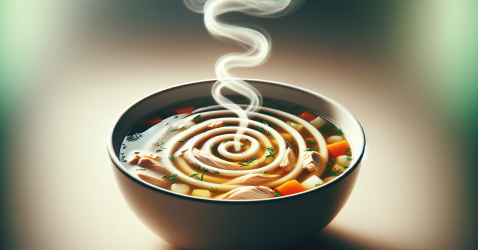Cooking As Therapy: Comfort Foods For The Soul
Everyone has experienced moments when cooking has served as a therapeutic escape – a form of self-care that nourishes not just the body, but also the soul. In this article, we will explore the power of cooking as therapy and how comfort foods can provide solace during challenging times. From the familiar warmth of homemade chicken soup to the nostalgic embrace of freshly baked chocolate chip cookies, we will delve into the science behind why these foods hold a special place in our hearts. So, put on your apron, gather your ingredients, and let the healing power of cooking wash over you as we uncover the beauty of comfort foods for the soul.
The Therapeutic Benefits of Cooking
Cooking is not just a mundane chore or a necessary task to feed ourselves; it can be a powerful tool for improving our mental and emotional well-being. Engaging in cooking has been found to have numerous therapeutic benefits, from reducing stress and anxiety to boosting mood and creativity. Whether you are a seasoned chef or a beginner in the kitchen, harnessing the therapeutic power of cooking can have a profound positive impact on your overall well-being.
Reduces Stress and Anxiety
One of the key therapeutic benefits of cooking is its ability to reduce stress and anxiety. The act of preparing and cooking a meal requires focus and concentration, allowing you to temporarily escape from the pressures and worries of daily life. The process of chopping vegetables, stirring sauces, and following a recipe can be a meditative experience, providing a sense of calm and relaxation. Additionally, the aromas and flavors that fill the kitchen can have a soothing effect on the mind, helping to alleviate stress and promote a sense of well-being.
Boosts Mood and Mental Well-being
Cooking has the power to boost mood and improve mental well-being. When you engage in cooking, especially when preparing comfort foods that evoke fond memories, the act of creating something delicious can bring about feelings of joy, satisfaction, and accomplishment. The process of cooking releases endorphins, which are natural mood enhancers, and can help alleviate symptoms of depression and anxiety. Additionally, cooking allows you to express your creativity and provides a sense of purpose, both of which are essential for maintaining good mental health.
Enhances Creativity and Focus
Cooking is a form of creative expression that can enhance your creativity and focus. When you step into the kitchen, you have the opportunity to experiment with ingredients, flavors, and techniques, allowing your imagination to run wild. Trying new recipes and tweaking existing ones can spark your creativity and allow you to tap into your culinary skills. The act of cooking also requires focus and attention to detail, as you need to follow recipes, measure ingredients, and time your cooking processes correctly. This focus can help you develop better concentration skills, improve your ability to stay present in the moment, and enhance your overall focus and attention span.
Provides a Sense of Accomplishment
The process of cooking provides a tangible and delicious outcome that can give you a sense of accomplishment. From selecting the ingredients to preparing and presenting the final dish, each step offers an opportunity for you to take pride in your culinary creation. Seeing the finished product and sharing it with others can bring about feelings of satisfaction and achievement, boosting your self-esteem and sense of self-worth. This sense of accomplishment can have a positive impact on your overall well-being and can even motivate you to explore new recipes and culinary endeavors.
The Science Behind Comfort Foods
Comfort foods often hold a special place in our hearts. There is a reason why certain dishes make us feel warm, nostalgic, and comforted. The science behind comfort foods reveals the psychological connection, neurochemical reactions, and the strong link between comfort foods and memories.
The Psychological Connection
Comfort foods are deeply rooted in our psychology and are associated with feelings of emotional warmth and security. These foods often remind us of our past and evoke a sense of nostalgia. From the creamy macaroni and cheese that brings back childhood memories to the homemade chicken soup that provides comfort during times of illness, comfort foods have a profound psychological connection. They are associated with positive emotions, which can alleviate stress and provide a sense of psychological well-being.
Neurochemical Reactions
When we consume comfort foods, our brain releases neurochemicals that contribute to the feelings of pleasure and satisfaction. These neurochemical reactions are responsible for the soothing and mood-boosting effects that comfort foods often provide. Foods high in carbohydrates, such as pasta and bread, stimulate the production of serotonin, a neurotransmitter that is associated with feelings of happiness and well-being. Additionally, foods rich in fats, like chocolate and cheese, trigger the release of endorphins, which are natural pain relievers and mood enhancers. These neurochemical reactions further reinforce the emotional and psychological benefits of comfort foods.
Comfort Foods and Memories
The strong connection between comfort foods and memories is not a coincidence. The act of preparing and consuming comfort foods is often associated with significant life events, family gatherings, and positive experiences. These associations create powerful memories that become intertwined with the taste, aroma, and texture of the food itself. When we revisit these comfort foods, it can transport us back to those cherished moments and evoke the same feelings of warmth, love, and happiness. The familiarity and nostalgia that comfort foods provide can be a source of great comfort and emotional support, especially during challenging times.
Exploring the Connection: Emotions and Food
Food and emotions are deeply interconnected. We often turn to food as a source of comfort, both in times of joy and sorrow. However, there is a distinction between emotional eating and using cooking as a therapeutic outlet. Understanding and identifying the emotional triggers that drive our food-related behaviors can help us foster a healthier relationship with food.
Emotional Eating vs. Cooking as Therapy
Emotional eating refers to the act of consuming food in response to emotional states, such as stress, sadness, or loneliness. It often involves mindlessly eating to numb or distract ourselves from unpleasant emotions. In contrast, cooking as therapy involves using the act of cooking as a way to process and express emotions in a healthier manner. Instead of using food as a coping mechanism, cooking allows us to channel our emotions into a creative and productive outlet. By actively engaging in the cooking process, we become more mindful of our emotions and gain a better understanding of their underlying causes.
Identifying Food-Related Emotional Triggers
Recognizing the emotional triggers that drive our food-related behaviors is a crucial step in using cooking as a therapeutic outlet. Whether it is stress, boredom, or loneliness, understanding the emotions that lead us to turn to food can help us develop healthier coping mechanisms. Keeping a food and emotion journal can be a helpful tool in identifying patterns and triggers. By recording your emotions before, during, and after cooking or eating, you can start to discern the connections between your emotional state and your food choices. This awareness allows you to make more conscious decisions and find alternative ways to address your emotional needs.
Using Cooking as a Healthy Emotional Outlet
Cooking can be a healthy and productive way to channel and express your emotions. When you feel overwhelmed or stressed, instead of reaching for unhealthy snacks or comfort foods, consider engaging in cooking therapy. Choose recipes that allow you to focus on the process and let your emotions guide your culinary creations. Experiment with flavors, textures, and ingredients that resonate with your emotions. Allow the act of cooking to provide you with a sense of control and accomplishment, as you create something nourishing and delicious. By actively engaging your mind and body in the cooking process, you can transform your emotions into a positive and therapeutic experience.

















